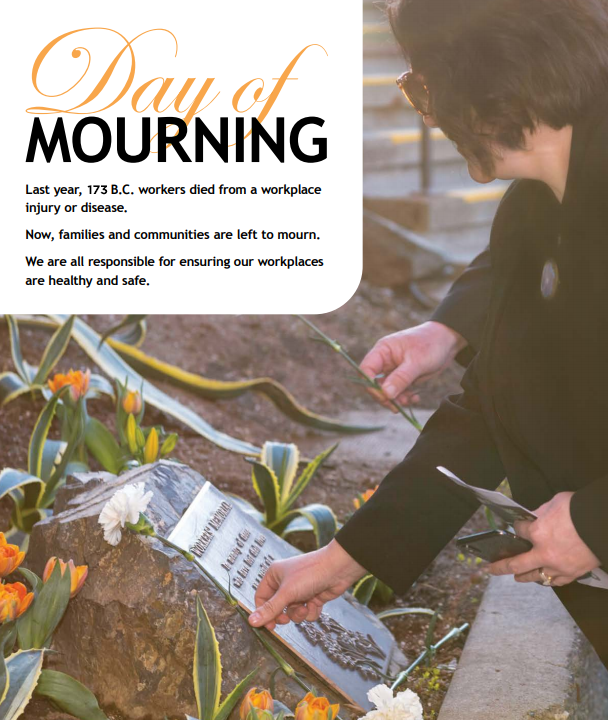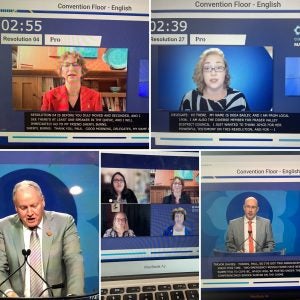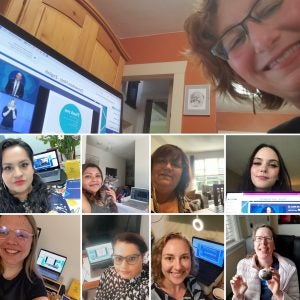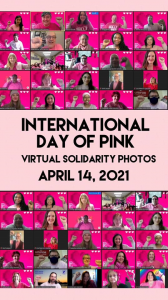
Dear friends,
I wanted to let you know about the plans for this year’s commemoration of the National Day of Mourning on Wednesday, April 28.
As you know, the National Day of Mourning honours the memory of workers who have been killed, injured, or suffered illness as a result of their work. This is one of the most sacred days on our calendar.
It causes all of us real pain to know we can’t gather in person for the second year as we continue to deal with the pandemic. In fact, we are now fighting the most virulent wave of COVID 19 – which is itself a reminder of the dangers facing working people. But this date is too important for us to allow it to go unmarked.
So once again we are co-sponsoring the Day of Mourning along with the WCB, the Business Council of BC and the Vancouver and District Labour Council.
This year, instead of a face-to-face event, we will be observing the day with a virtual ceremony. It begins at 10:30 am on Wednesday, April 28, 2021.
Please join us then at https://DayOfMourning.bc.ca.
And encourage friends, colleagues and members to come too. We may be separated by this pandemic, but we can still be together in grief, condolence and solidarity. A note that we ask that no wreaths be laid in the plaza.
We’ll mourn the dead and fight for the living. That means we recommit to our efforts to protect the safety and well-being of working people by:
Improving workplace health and safety;
Rigorously enforcing occupational health and safety regulations – and holding those who violate them to account;
Preserving the dignity of the thousands of workers who suffer injury or illness; and
Ensuring full compensation to those who have been hurt at work.
Together, we’ll do all we can to reach the goal I know you and I share: a province where every worker can go home safe and healthy at the end of every workday.
In solidarity,
W. LAIRD CRONK SUSSANNE SKIDMORE
President Secretary-Treasurer
BC Federation of Labour | 200-5118 Joyce Street | Vancouver BC V5R 4H1
The BC Federation of Labour is located on unceded xʷməθkʷəy̓əm (Musqueam),
səl̓ílwətaʔɬ (Tsleil-Waututh), Skwxwú7mesh (Squamish) territories.
This year, instead of a face-to-face event, we will be observing the day with a virtual ceremony. It begins at 10:30 am on Wednesday, April 28, 2021.
Please join us then at https://DayOfMourning.bc.ca.
And encourage friends, colleagues and members to come too. We may be separated by this pandemic, but we can still be together in grief, condolence and solidarity. A note that we ask that no wreaths be laid in the plaza.
We’ll mourn the dead and fight for the living. That means we recommit to our efforts to protect the safety and well-being of working people by:
- Improving workplace health and safety;
- Rigorously enforcing occupational health and safety regulations – and holding those who violate them to account;
- Preserving the dignity of the thousands of workers who suffer injury or illness; and
- Ensuring full compensation to those who have been hurt at work.
Together, we’ll do all we can to reach the goal I know you and I share: a province where every worker can go home safe and healthy at the end of every workday.
In solidarity,
- LAIRD CRONK SUSSANNE SKIDMORE
President Secretary-Treasurer
BC Federation of Labour | 200-5118 Joyce Street | Vancouver BC V5R 4H1
The BC Federation of Labour is located on unceded xʷməθkʷəy̓əm (Musqueam),
səl̓ílwətaʔɬ (Tsleil-Waututh), Skwxwú7mesh (Squamish) territories.




